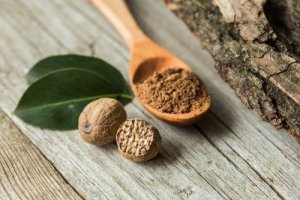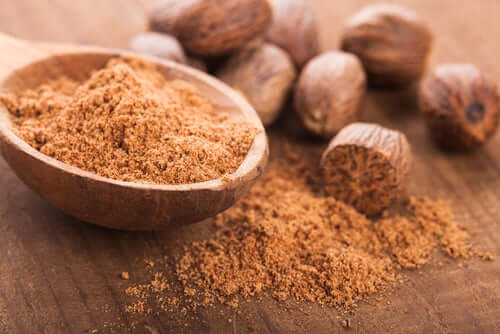Scientifically Proven Benefits of Nutmeg


Written and verified by the nutritionist Saúl Sánchez Arias
Nutmeg is a spice from Indonesia that has medicinal properties. People use this spice often in gastronomy, as it enhances the flavor of many recipes. Although many prefer to grate it on meals, others like to enjoy it in teas. We’ll be discussing the benefits of nutmeg in this article.
Among other things, this spice is rich in vitamins A, B, and C. Also, it contains minerals such as magnesium, phosphorus, iron, and potassium. So, it’s quite nutritious, apart from the health claims we’ll present below.
The benefits of nutmeg
Liver protection
Nutmeg has the property of fighting hyperlipidemia, hyperglycemia, damage to heart tissue, and hepatotoxicity. Although most of the studies that confirm these facts were conducted on mice, experts observed efficient protection of the liver.
In addition, due to its monoterpenes content, it’s also protective against heart disease. These compounds have anticoagulant properties and protect from problems such as thrombosis.

Although the evidence is still limited, experts believe that nutmeg has properties that can protect the liver.
It can help relieve gout symptoms
Other benefits of nutmeg are its anti-inflammatory and pain-relieving properties; it can help to relieve joint swelling and fight the pain caused by chronic inflammation. Experts conducted studies related to this fact on mice, and so they need to conduct further studies to analyze this effect in humans.
However, its anti-inflammatory properties were corroborated.
You should also read: 4 Herbs and Spices to Promote Hair Growth
You can use nutmeg as an exfoliant
In this regard, combining nutmeg powder with honey results in an effective way to treat certain skin conditions. You can apply the resulting product as a natural exfoliant that removes dead skin cells and oil accumulation.
Moreover, you can make acne-fighting masks with this product. Its antiseptic and regenerative effects make it an ideal spice for these functions.
Nutmeg can be toxic at high doses
Consuming this spice in excess (from one to three nuts) can cause adverse side effects. The volatile oils it contains, which consist of alkylbenzene derivatives, terpenes, and myristic acid, may cause nausea, hallucinations, inflammation, and shock. Therefore, it’s important to consume this food in moderation.
In some cases, it may result in relaxing sensations similar to those of cannabis. However, an overdose most commonly causes dehydration and widespread pain. The effects last more than 24 hours and even may exceed 36 hours.
In addition, it isn’t clear which of the compounds has greater toxicity. In this regard, experts believe that myristicin can be oxidized in a more water-soluble amphetamine metabolite.

Ingested in large quantities, nutmeg can be harmful to health. Therefore, you should always consume it in moderation.
Forms of nutmeg
On the market, whole nutmeg is available, as well as ground nutmeg and as an essential oil. The latter is obtained from the distillation of ground nutmeg and is primarily used in the pharmaceutical and perfumery industries.
Also, it contains compounds of interest to the oleochemical industry and it’s used as a flavoring. In addition, people can use nutmeg oil to treat rheumatic pain, as well as an emergency method to treat toothaches.
Furthermore, you can also buy nutmeg butter, which is a brown semisolid substance. 75% of it is trimyristin, which can become myristic acid. People use this fatty acid as a substitute for cocoa butter and as an industrial lubricant.
You should also read: 8 Spices that You Can Use as a Salt Substitute
Conclusion on nutmeg
Nutmeg is a product with multiple culinary uses. But besides its organoleptic potential, it has certain health-promoting properties.
Despite the fact that human studies are needed to completely prove its properties, using nutmeg moderately may help improve certain diseases or conditions. However, this spice doesn’t offer miraculous solutions and you should consume it in moderation due to the risk of an overdose.
For this reason, experts don’t recommend exceeding the daily amounts. If you do, go to the doctor quickly to prevent further problems.
All cited sources were thoroughly reviewed by our team to ensure their quality, reliability, currency, and validity. The bibliography of this article was considered reliable and of academic or scientific accuracy.
- Abourashed E. A., El-Alfy A. T. (2016). Chemical diversity and pharmacological significance of the secondary metabolites of nutmeg (Myristica fragrans Houtt.). Phytochemical Reviews. 15 (6): 1035-1056. Recuperado en: https://www.ncbi.nlm.nih.gov/pmc/articles/PMC5222521/
- Champasuri S., Itharat A. (2016). Bioactivities of ethanol extracts of three parts (wood, nutmeg and mace) from Myrisitica fragrans Houtt. Journal of the Medical Association of Thailand. 99 (Suppl 4): 124-30. Recuperado de: https://pubmed.ncbi.nlm.nih.gov/29926690/
- Ehreinpreis J. E., Des Lauriers C., Lank P., et al. (2014). Nutmeg poisonings: a retrospective review of 10 years experience form Illinois Poison Center, 2001-2011. Journal of Medical Toxicology. 10 (2): 148-151. Recuperado de: https://www.ncbi.nlm.nih.gov/pmc/articles/PMC4057546/
- Pashapoor A., Mashhadyrafie S., Mortazavi P. (2020). Ameliorative effect of Myrisitica fragrans (nutmeg) extract on oxidative status and histology of pancreas in alloxan induced diabetic rats. Folia Morphologica. 79 (1): 113-119. Recuperado de: https://pubmed.ncbi.nlm.nih.gov/31063201/
- Pizzino G., Irrera N., Cucinotta M., et al. (2017). Oxidative stress: harms and benefits for human health. Oxidative Medicine and Cellular Longevity. 2017: 8416763. Recuperado de: https://www.ncbi.nlm.nih.gov/pmc/articles/PMC5551541/
- FDA. Substances generally recognized as safe. (2023). U. S. Food and Drug Administration (FDA). Recuperado el 14 de marzo de 2023 en: https://www.accessdata.fda.gov/scripts/cdrh/cfdocs/cfcfr/cfrsearch.cfm?fr=182.10
- Yang X. N., Liu, X. M., Fang J. F., et al. (2018). PPAR⍺ mediates the hepatoprotective effects of nutmeg. Journal of Proteome Research. 17 (5): 1887-1897. Recuperado de: https://www.ncbi.nlm.nih.gov/pmc/articles/PMC6628927/
- Zhang W. K., Tao Sh., Li T., et al. (2016). Nutmeg oil alleviates chronic inflammatory pain through inhibition of COX-2 expression and substance P release in vivo. Food and Nutrition Research. 60: 103402. Recuperado de: https://www.ncbi.nlm.nih.gov/pmc/articles/PMC4848392/
- Zhao W., Guo M., Feng J., et al. (2022). Myristica fragrans extract regulates gut microbes and metabolites to attenuate hepatic inflammation and lipid metabolism disorders via the AhR.FAS and NF-kB signaling pathways in mice. Nutrients. 14 (9): 1699. Recuperado de: https://www.ncbi.nlm.nih.gov/pmc/articles/PMC9104743/
This text is provided for informational purposes only and does not replace consultation with a professional. If in doubt, consult your specialist.








